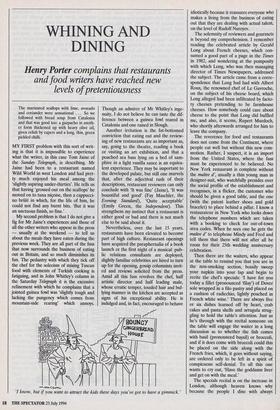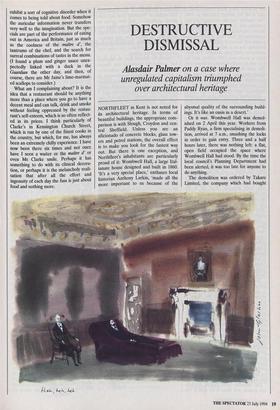WHINING AND DINING
Henry Porter complains that restaurants
and food writers have reached new levels of pretentiousness
The marinated scallops with lime, avocado and coriander were sensational .. . So we followed with bread soup from Catalonia and that was good too: a gazpacho in anoth- er form thickened up with heavy olive oil, given relish by capers and a long, thin, green pickled chilli.
MY FIRST problem with this sort of writ- ing is that it is impossible to experience what the writer, in this case Tom Jaine of the Sunday Telegraph, is describing. Mr Jaine had been to a restaurant named Wild World in west London and had pret- ty much enjoyed his meal among the 'slightly aspiring under-thirties'. He tells us that having 'grossed out on the scallops' he moved on to tuna nigoise, then a cappucci- no braid in which, for the life of him, he could not find any burnt bits. 'But it was an unctuous finish, so fine.'
My second problem is that I do not give a fig for Mr Jaine's experiences and those of all the other writers who appear in the press — usually at the weekend — to tell us about the meals they have eaten during the previous week. They are all part of the fuss that now surrounds the business of eating out in Britain, and so much diminishes its fun. The pedantry with which they tick off the chef for the solecism of mixing Tuscan food with elements of Turkish cooking is fatiguing, and in John Whidey's column in the Saturday Telegraph it is the excessive refinement with which he complains that a jointed guinea fowl was 'slightly tough and lacking the pungency which comm from mountain-side rearing' which annoys.
Though an admirer of Mr Whitley's inge- nuity, I do not believe he can taste the dif- ference between a guinea fowl reared in Catalonia and one raised in Slough.
Another irritation is the fat-bottomed conviction that eating out and the review- ing of new restaurants are as important as, say, going to the theatre, reading a book or visiting an art exhibition, and that a poached sea bass lying on a bed of sam- phire in a light vanilla sauce is an equiva- lent experience. They may be important to the developed palate, but still one marvels that, after the adjectival rush of their descriptions, restaurant reviewers can only conclude with 'It was fine' (Jaine), 'It was bountiful and good' (Fay Maschler, the Evening Standard), 'Quite acceptable' (Emily Green, the Independent). This strengthens my instinct that a restaurant is either good or bad and there is not much else to be said about it.
Nevertheless, over the last 15 years, restaurants have been elevated to become part of high culture. Restaurant openings have acquired the paraphernalia of a book launch or the first night of a musical: pub- lic relations consultants are deployed, slightly familiar celebrities are hired to turn up for the opening, gossip columnists invit- ed and reviews solicited from the press. Amid all this fuss revolves the chef, half artistic director and half leading male, whose erratic temper, tousled hair and bul- lying manner in the kitchen are accepted as signs of his exceptional ability. He is indulged and, in fact, encouraged to behave 'I know, but if you want to attract the kids these days you've got to have a gimmick.' idiotically because it reassures everyone who makes a living from the business of eating out that they are dealing with actual talent, on the level of Rudolf Nureyev.
The solemnity of reviewers and gourmets is beyond my comprehension. I remember reading the celebrated article by Gerald Long about French cheeses, which con- sumed a good part of a page in the Times in 1982, and wondering at the pomposity with which Long, who was then managing director of Times Newspapers, addressed the subject. The article came from a corre- spondence that Long had had with Albert Roux, the renowned chef of Le Gavroche, on the subject of his cheese board, which Long alleged had been infiltrated by facto- ry cheeses pretending to be farmhouse cheeses. How somebody could care about cheese to the point that Long did baffled me, and also, it seems, Rupert Murdoch, who shortly afterwards arranged for him to leave the company.
The reverence for food and restaurants does not come from the Continent, where people eat well but without this new com- motion. Rather, I suspect, it is an import from the United States, where the fuss must be experienced to be believed. No New York restaurant is complete without the maitre d', usually a thin young man in designer-suit, who watchfully presides over the social profile of the establishment and recognises, in a flicker, the customer who should be given a good table, and the one (with the patent leather shoes and gold bracelet) to place behind a pillar. I know a restaurateur in New York who looks down the telephone numbers which are taken with a booking to check for out-of-town area codes. When he sees one he gets the maitre d' to telephone Mindy and Fred and tell them that there will not after all be room for their 25th wedding anniversary celebration.
Then there are the waiters, who appear at the table to remind you that you are in the non-smoking section, bossily sweep your napkin into your lap and begin to recite the chefs specials: 'I have for you today a fillet (pronounced Way') of Dover sole wrapped in a fib o pastry and placed on a cushion of radicchio, lightly poached in French white wine.' There are always five or six dishes learned off by heart, crab cakes and pasta shells and arrugula strug- gling to hold the table's attention. Just as he's through with the recital someone on the table will engage the waiter in a long discussion as to whether the fish comes with basil (pronounced baysil) or broccoli, and if it does come with broccoli could this be placed on the side along with the French fries, which, it goes without saying, are ordered only to be left in a spirit of conspicuous self-denial. To all this one wants to cry out, 'Have the goddamn liver and get on with the meal.'
The specials recital is on the increase in London, although heaven knows why because the people I dine with always
exhibit a sort of cognitive disorder when it comes to being told about food. Somehow the auricular information never transfers very well to the imagination. But the spe- cials are part of the performance of eating Out in America and Britain, just as much as the coolness of the maitre d', the tantrums of the chef, and the search for surreal combinations of tastes in the menu. (I found a plum and ginger sauce unex- pectedly linked with a duck in the Guardian the other day, and then, of course, there are Mr Jaine's lime-marinat- ed scallops to consider.) What am I complaining about? It is the idea that a restaurant should be anything more than a place where you go to have a decent meal and can talk, drink and smoke without feeling oppressed by the restau- rant's self-esteem, which is so often reflect- ed in its prices. I think particularly of Clarke's in Kensington Church Street, which is run by one of the finest cooks in the country, but which, for me, has always been an extremely chilly experience. I have now been there six times and not once have I seen a waiter or the maitre d' or even Ms Clarke smile. Perhaps it has something to do with its clinical decora- tion, or perhaps it is the melancholy reali- sation that after all the effort and ingenuity of each day the fuss is just about food and nothing more.



















































 Previous page
Previous page